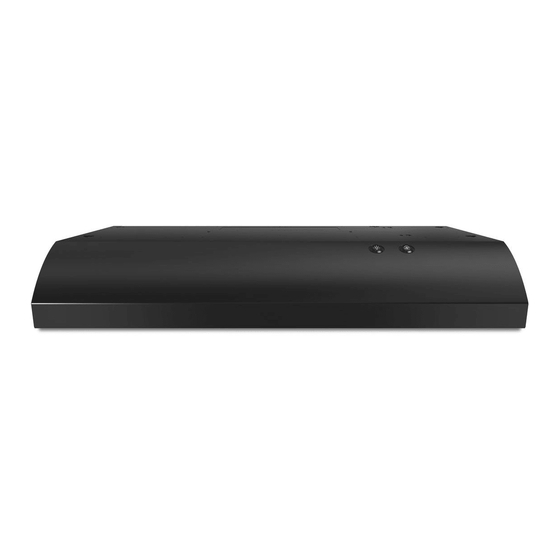Whirlpool UXT4236AD Installationsanleitung und Gebrauchs- und Pflegeanleitung - Seite 4
Blättern Sie online oder laden Sie pdf Installationsanleitung und Gebrauchs- und Pflegeanleitung für Lüftungshaube Whirlpool UXT4236AD herunter. Whirlpool UXT4236AD 28 Seiten. 30" (76.2 cm) and 36" (91.4 cm) range hood
Auch für Whirlpool UXT4236AD: Installationsanleitung Handbuch (34 seiten), Installationsanleitung und Gebrauchs- und Pflegeanleitung (28 seiten)

Product Dimensions
2"
(5.1 cm)
4¹⁵⁄₁₆"
1"
(12.5 cm)
(2.5 cm)
29¹⁵⁄₁₆" (76.0 cm) or
35¹⁵⁄₁₆" (91.0 cm)
Installation Clearances
A
B
E
A. 18" (45.7 cm) minimum distance from electric cooking surface.
24" (61.0 cm) minimum distance from gas cooking surface.
30" (76.2 cm) suggested maximum above the cooking surface.
B. 18" (45.7 cm) minimum clearance - upper cabinet to countertop.
C. 30" (76.2 cm) minimum cabinet opening width for 30" (76.2 cm)
models and 36" (91.4 cm) minimum cabinet width for 36"
(91.4 cm) models.
D. 12" (30.5 cm) cabinet depth.
E. 36" (91.4 cm) base cabinet height.
4
6⁹⁄₁₆" (16.7 cm) or
9⁹⁄₁₆" (24.4 cm)
9"
(22.9 cm)
1¹⁄₂"
18⁵⁄₈"
(3.8 cm)
(47.3 cm)
C
D
Venting Methods
NOTES:
Flexible vent is not recommended. Flexible vent creates both
1"
back pressure and air turbulence that greatly reduce
(2.5 cm)
performance.
The vent system is optional for this model.
Vent system can terminate either through the roof or wall. Use
3¹⁄₄" x 10" (8.3 x 25.4 cm) rectangular with a maximum vent
length of 35 ft (10.7 m) or 7" (17.8 cm) or larger round vent with a
maximum length of 50 ft (15.2 m) for vent system.
Top Venting
A
A. 7" (17.8 cm) round vent
through roof
(purchased separately).
3¹⁄₄" x 10" (8.3 x 25.4 cm)
rectangular vent through the
roof (purchased separately).
B. Roof cap with damper
(purchased separately)
Cold Weather Installations
An additional back draft damper should be installed to minimize
backward cold air flow and a thermal break should be installed to
minimize conduction of outside temperatures as part of the vent
system. The damper should be on the cold air side of the thermal
break.
The break should be as close as possible to where the vent
system enters the heated portion of the house.
Makeup Air
Local building codes may require the use of makeup air systems
when using ventilation systems greater than specified CFM of air
movement. The specified CFM varies from locale to locale.
Consult your HVAC professional for specific requirements in your
area.
Venting Requirements
Vent system must terminate to the outdoors, except for non-
vented (recirculating) installations.
Do not terminate the vent system in an attic or other enclosed
area.
Do not use a 4" (10.2 cm) laundry-type wall cap.
Use 7" (17.8 cm) round metal vent or 3¹⁄₄" x 10" (8.3 x
25.4 cm) rectangular metal vent, depending on your
installation requirement. Rigid metal vent is recommended.
Plastic or metal foil vent is not recommended.
The length of vent system and number of elbows should be
kept to a minimum to provide efficient performance.
Venting System
Wall Venting
B
A
A. 7" (17.8 cm) round vent out
the top and through the wall
(purchased separately).
3¹⁄₄" x 10" (8.3 x 25.4 cm)
rectangular vent through the
wall or out the top (purchased
separately).
B. Wall cap with damper
(purchased separately)
B
